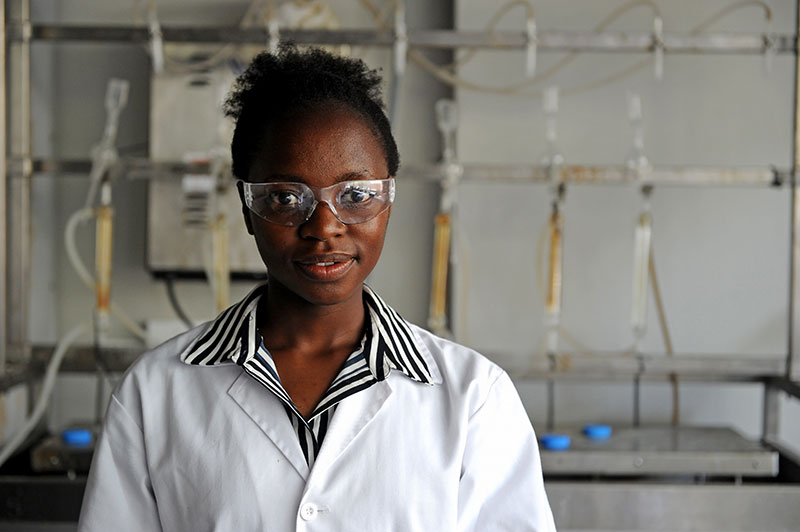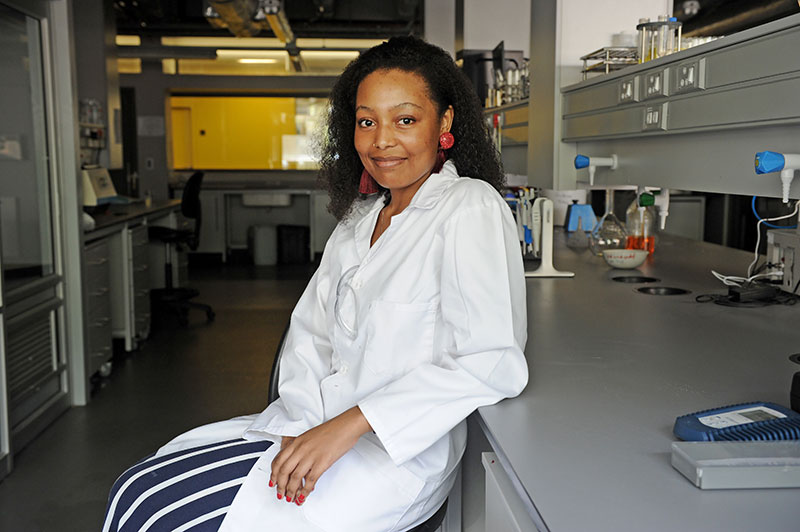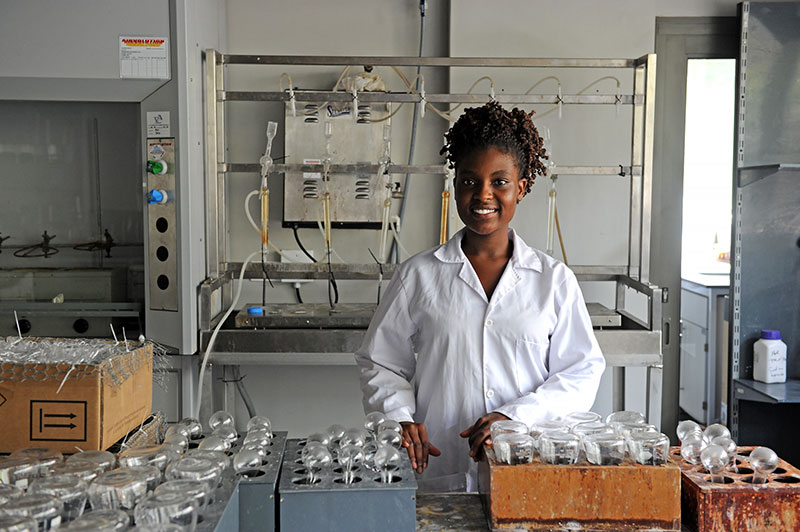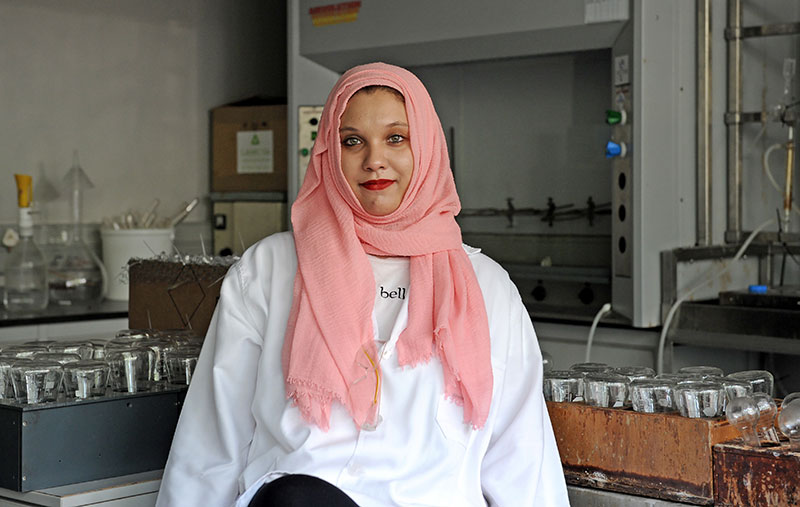Women take top spots in civil engineering
09 April 2020 | Story Helen Swingler. Photos. Lerato Maduna. Video Roxanne Harris. Voice Lerato Molale. Read time >10 min.For the second year in a row, women have taken most of the top spots in the final-year civil engineering class at the University of Cape Town (UCT).
Four of the top five students from the class of 2019 are women.
They are Mwana Mwale, who was top of the class, Ameenah Abrahams, Tarie Mufunde and Rhonda Hyde. Mwana also won second place for her research thesis in the South African Institution of Civil Engineering National Investigative Project Showdown earlier this year. Tarie was third in the Growthpoint Greenovate Awards for innovative and green engineering honours thesis for South African universities. She is also a member of the Klaus-Jürgen Bathe Leadership Programme 2018 cohort.
Mwana, Tarie and Rhonda are continuing their studies as master’s students at UCT this year under the supervision of Dr Dyllon Randall, a senior lecturer in civil engineering. Mwana is being co-supervised by Dr Marique Aucamp, a senior lecturer at the University of the Western Cape, while Rhonda is being co-supervised by UCT PhD candidate Lita Nolutshungu. Ameenah has started work at Aurecon in the Global Design Centre’s water unit.
In the previous year’s graduating class, six of the 11 first-class honours students were women. The top student was Chloë Bolton.
Women still a minority
Despite this good news, the numbers of women in engineering at UCT are still relatively low, said Dean of Engineering & the Built Environment Professor Alison Lewis.
In civil engineering and other “traditional” engineering streams the number hovers at around 29%, occasionally hitting 30%. But in chemical engineering women are 50% of the students, and in architecture it’s as high as 60%.
There’s plenty of work still to be done to promote engineering to women, starting with young girls at school, added Lewis.
This year 48 faculty scholarships were made available to women.
However, Lewis said, many of the women who were attracted to engineering were primarily interested in the field as a means of building into the future of the planet: sustainability, climate change and making a difference in the community, locally and globally.
She praised the foursome for their determination and resilience.
“I know they faced many obstacles to get there. It’s tremendous to have great role models.”
“I know they faced many obstacles to get there. It’s tremendous to have great role models. Thank you so much. You have done the faculty proud.”
The faculty’s deputy dean for transformation, Professor Marianne Vanderschuren, added a further perspective: “The first class I taught back in 2001 had 24% women. At the time, this was slightly above the global average. Although the percentage of women hasn’t increased significantly, we see the impact of a sustained stream of women graduates in industry.
“Currently I’m advising on a project in the City of Ekurhuleni and three of the five main contributors are women – and all are master’s graduates of UCT.”
Breaking social norms
Randall said he first met the four students in their third year when he was their water treatment lecturer.
“In their fourth year they decided to do their research topics with me as a supervisor. It’s been an absolute pleasure supervising them and watching them grow from strength to strength.
“Not only are they helping break down barriers when it comes to our view of ‘waste’ water, but they are also breaking down social norms. I’m thankful every day that our paths crossed and I’m excited to see what these amazing young women will continue to accomplish as we strive for a more just and better future.”
With transformation and equity in mind, the faculty has worked hard over the past few years to attract more women, primarily through its #WomeninEngineering and “This is what an engineer looks like” campaigns.
Last year a video on UCT’s women engineering staff was used to promote engineering to girls at high schools. And in August the faculty hosted a Women in Engineering event for grade 11s and 12s.
Top four
The four graduands shared their thoughts on transformation, community and changes in the workplace.
Mwana Mwale

Mwana sees civil engineering as the backbone of every community and every facet of people’s lives.
“To be a part of that means that I can change people’s lives.”
This was evident in her final thesis research, which was inspired by the city’s recent Day Zero water crisis and focused on the reuse of wastewater streams to alleviate water scarcity.
Having worked in the field during her vacations, she was not overly fazed by “fitting in” once she enters work life. But the journey can be lonely.
“For me there is no male civil engineer or a female civil engineer, we are all civil engineers. However, having more women in civil engineering helps to inspire others to know that they too can do it.
“It should be a matter of understanding one another and finding common ground.”
“A lesson I [learnt] was that it’s important to acknowledge that women think and reason differently to men. The problem comes when people assume that the treatment given to men and women must be different. It should be a matter of understanding one another and finding common ground, even if it means compromise from either side.”
However, the practical application of the support given to women could be ratcheted up, she said.
“The journey is not easy, especially if you feel like you are walking it alone. Having someone alongside with the same goals, vision and mindset will certainly help.”
Rhonda Hyde

For Rhonda civil engineering offers opportunities to marry creativity, science and sustainability.
“With continued population growth, climate change and the decline of natural resources, waste recovery is becoming increasingly relevant. Innovation in this direction is something I’d like to be a part of.”
The role of women in civil engineering as well as other science, technology, engineering and maths (STEM) fields is crucial, she said, providing fresh perspectives in a male-dominated sphere.
“As we are taught in civil engineering, the most successful designs are functional ones. In other words, designing with the end-user in mind. In a country with such diverse demographics, more and more perspectives are needed to ensure more inclusive and functional infrastructure in a developing economy.”
“There were many times on site where I felt unsafe, uncomfortable and directly excluded from important conversations.”
The workplace needs more attention, she said, reflecting on her vacation work experiences.
“More needs to be done to address the work environment for female engineers. There were many times on site where I felt unsafe, uncomfortable and directly excluded from important conversations by male employees, based simply on my gender and my race. This is just one example out of many experiences shared by black women in the STEM fields.”
Tarie Mufunde

A Zimbabwean national, Tarie’s choice of civil engineering makes perfect sense, given the serious water and sanitation challenges in her country.
“Solutions such as water harvesting and waste recycling may seem obvious, but the opportunity to learn about these problems and possible solutions and how to implement the solutions is priceless.”
But women still encounter the old stigmas in the field.
“Each time I mentioned I was coming to UCT to study civil engineering, I received negative remarks, even from people I thought were ‘woke’.
“But I learnt that within the classroom set-up, you need to be assertive and confident and remember that even those who might seem intimidating (male or female) are also trying to keep up.”
“These are some of the barriers that still need to be [broken], but it starts with us walking on site owning the title and doing our job.”
Working on site is a challenge; some construction workers are still fixed in their perceptions of women engineers.
“These are some of the barriers that still need to be [broken], but it starts with us walking on site owning the title and doing our job.”
Ameenah Abrahams

Civil engineering isn’t such a male-dominated industry any longer, said Ameenah, who started a full-time job in February in the Global Design Centre’s water unit, which works on water projects in Australia.
“It’s got to do with a lot of hydraulics. Basically, some pipelines here and there, some pumping systems and a whole lot of patience and persevering.
“Currently I’m surrounded by a team of 11 exceptional people, and I hope to learn a lot from them. There has been a lot of debate around whether women were being treated fairly and whether we should be investing in them. The only answer I have in the above debate is that in my experience this really isn’t such a male prominent industry anymore. So clearly, we women are doing something right.”
“The world is slowly changing, and the engineering field is changing along with it.”
She added, “The world is slowly changing, and the engineering field is changing along with it. I could talk all day about how gender does not affect a situation or influence a certain trend of thought, but unfortunately it does … It’s all about perception, I think … If we can change the way we think, we can all go pretty far.”
 This work is licensed under a Creative Commons Attribution-NoDerivatives 4.0 International License.
This work is licensed under a Creative Commons Attribution-NoDerivatives 4.0 International License.
Please view the republishing articles page for more information.
Graduation March 2020
We understand the disappointment that our students and their families feel about the suspension of the March 2020 graduation ceremonies. Please know that the decision to suspend the ceremonies was not taken lightly. We congratulate the March 2020 qualifiers on their academic success. All graduands will graduate in absentia, with a confer date of 19 March 2020. Graduation certificates will be issued to qualifiers and the Registrar has communicated directly with all qualifiers about the arrangements for the issue of graduation certificates and transcripts.
Find full information, including Frequently Asked Questions, on the Graduation page on the Students website.
Our stories: inspirational graduates
Although UCT has suspended the March graduation season because of concerns about the spread of Covid-19, the news team would nonetheless like to honour those who would have been capped. We have chosen to profile a cross-section of inspirational graduands whose stories we’d like to share. To all those we haven’t been able to feature, we’d like to say: each one of you is an inspiration – to your university, your families and your communities. Stay healthy.






















